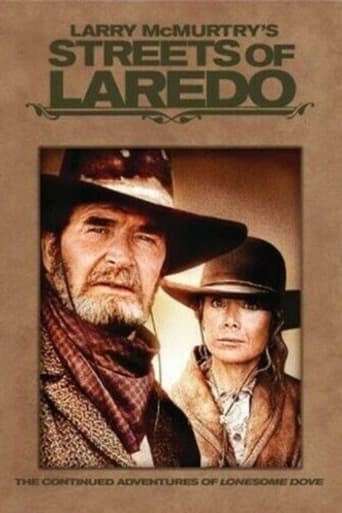Steve Skafte
First of all, the vast majority of those giving "Streets of Laredo" bad reviews have no legitimate complaints whatsoever. People whine about the dark tone, the killings, the acting, et cetera. Rather, this film has much more in common with the real old west, to a greater degree even than series like "Deadwood". Of course, many of the immature, misguided western fans seem to want happy horse-riding hippies who talk hard and rough but don't live it. How stupid to expect such from the real killers of the west.Woodrow F. Call (James Garner) is not a nice man. And he should not be pigeonholed as one, either. Garner plays him the way he should be, and is even more impressive than Tommy Lee Jones in "Lonesome Dove", the series which preceded this one. Indeed, despite the rabid fanbase of "Lonesome Dove" (of which I very nearly belong), this series is undoubtedly superior. First of all, the direction is a vast improvement. Joseph Sargent handles the scenery and actors with far more intelligence and grace than Simon Wincer, who proved his woeful inadequacies when he returned for the prequel "Comanche Moon" last year. That series was pure trash, horribly acted and directed despite the great actors involved.There are many great performances beside Garner. Charles Martin Smith, Sam Shepard, and Sissy Spacek are pure class. Smith, especially, has always been an excellent unnoticed actor. This is perhaps his best performance since "Never Cry Wolf" (1983). He is sympathetic and identifiable as the nervous railman. Shepard and Spacek play husband and wife quite intuitively. Their character development is well-performed to the highest degree. This is also one of Spacek's best performances.Larry McMurtry has a very intuitive writing style, and the film carries over much of his subtlety. There's no overblown dialogue or direction to be found in "Streets of Laredo", something that the original "Lonesome Dove" series sometimes slipped into. I would say, without reservation, that this is one of the very best and most realistic depictions of the true west. A great film, with stunning acting and direction. A must see for any true film fan - narrow-minded western fans looking for a 'Hollywood' west need not apply.RATING: 8.5 out of 10
Scrivener3000
Randy Quaid is about as unlikely a candidate to play John Wesley Hardin, that stone killer, as you could possibly imagine. Quaid presumably lives in an old trailer waiting for the next National Lampoon "Vacation" movie -- but he brings it off brilliantly.Same thing with George Carlin as anything but a shriveled prune of an aging comedian doing conceptual humor ("Why do they call bread a staple? It doesn't have little sharp points. Weird.")But he, too, is perfectly cast.As sequels go, this one is a welcome surprise. I've attempted to watch some of the other "Lonesome Dove" sequels, but had to give up after a few minutes. I assumed the problem was the absence of most or all of the original actors -- but maybe the presence of McMurtry himself as screenwriter made all the difference.Yes, it would have been great to have Tommy Lee Jones back as Woodrow Call, but James Garner does a fine job. Sissy Spacek is also perfect as Lorena some years on.
jmcody
Granted, both the original Lonesome Dove novel and film are unique works of extremely fascinating classic story telling. Streets of Laredo obviously has a great deal to live up to and, when viewed or read in conjunction with Dove, it does suffer in the sense that our familiarity is slightly snubbed. Of course not much can measure up to the original, and so obviously this is something that cannot be helped. This sequel is far more brutal and violent that its predecessor. Violent death or at least the threat of it is an ever present character awash on Laredo's landscape much more than Dove.That said, Streets of Laredo as a film stands firmly upon its own merits which are quite impressive.Firstly, the cast is sublime. James Garner, always a vastly underrated actor, creates a stoic yet tragic Call. His final scene is at once heart breaking and resonating with strong quiet hope. His performance is all about what film acting aspires to become: he moves mountains without words.The rest of the cast is on equal footing with Garner. Playwrite Sam Shepard's Pea Eye, although losing much of Tim Scott's original Bentonesque forlorn rube, is filled with earthy heroism and and poetry. Sissy Spacek, as the whore re-incarnated as a schoolmarm Lorena produces the tough backbone needed to survive the Texas prarie. Comedian George Carlin's finely drawn panhandle scamp solidifies the theory that the border between comedy and tragedy is narrow at best. These are just a few of the excellent standouts in the sound ensemble.Secondly, there is the very narrative itself. It plays like a Sunday funeral dirge-ever aware of the passing of an era, yet peering into a glimmer future of simple optimism and hope. In McMurtry's frequently brutal world, everyone has a shot at redemption. Grace isn't free but it is availble to all willing to run the gauntlet, as long as they have a pure heart. In this film, pure of heart may not necessarily mean pure of deed, but at least evil is evil and good is good.This film bravely balances the aformentioned violence with scenes of wry humour and gentleness. In that regard, Laredo comes the closest anyone has come to honoring Peckinpah's greater works.The film, because it was produced for television is already mostly forotten by the minnions, but richly deserving of an audience. Enjoy and Savor.
cabuesch
Tommy Lee Jones was outstanding as the captain as was John Voight. James Garner was just playing James Garner playing Captain Call. Also, dropping the names of real people such as Charles Goodnight and John Wesley Hardin and the names of characters from other movies such as R.J. Poteet from Centennial was kind of lame.



